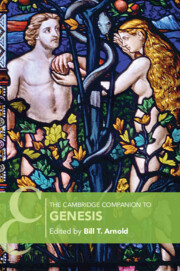Book contents
- The Cambridge Companion to Genesis
- Cambridge Companions to Religion
- The Cambridge Companion to Genesis
- Copyright page
- Contents
- Abbreviations
- Contributors
- 1 Introduction: Genesis and the status quaestionis
- Part I Composition and Structure of Genesis
- Part II Social World of Genesis
- Part III Themes and Literary Motifs of Genesis
- 10 From Imago to Imagines: The Image(s) of God in Genesis
- 11 Genesis, Science, and Theories of Origins
- 12 Genesis and Ethics
- 13 Genesis and the Problem of Evil: Philosophical Musings on the Bible’s First Book
- Part IV Reception History of Genesis
- Scripture Index
- Subject Index
- Cambridge Companions to Religion (continued from page iii)
- References
13 - Genesis and the Problem of Evil: Philosophical Musings on the Bible’s First Book
from Part III - Themes and Literary Motifs of Genesis
Published online by Cambridge University Press: 02 June 2022
- The Cambridge Companion to Genesis
- Cambridge Companions to Religion
- The Cambridge Companion to Genesis
- Copyright page
- Contents
- Abbreviations
- Contributors
- 1 Introduction: Genesis and the status quaestionis
- Part I Composition and Structure of Genesis
- Part II Social World of Genesis
- Part III Themes and Literary Motifs of Genesis
- 10 From Imago to Imagines: The Image(s) of God in Genesis
- 11 Genesis, Science, and Theories of Origins
- 12 Genesis and Ethics
- 13 Genesis and the Problem of Evil: Philosophical Musings on the Bible’s First Book
- Part IV Reception History of Genesis
- Scripture Index
- Subject Index
- Cambridge Companions to Religion (continued from page iii)
- References
Summary
In the book of Genesis, we find stories about beginnings. We read of God’s creation of the universe, the origin of man, the fall into sin, the first murder, the father of faith, the birth of Israel, and more. It is a world strangely unfamiliar to modern readers, yet familiarly strange. When it comes to the origin, nature, and explanation of evil, discussions among analytic philosophers usually focus on the relationship between propositions, found within arguments, that aim to show God’s existence is either compatible or incompatible with the reality of evil, or probable or improbable given the reality of evil. God, in the analytic mode, is understood as a personal being worthy of worship. This conception of God is common to the great monotheistic traditions found in Judaism, Christianity, and Islam. Much progress can be – and has been – made on the problem of evil at the level of “mere theism.”1 Yet, as we shall see, there is much more that can – and should – be incorporated into a full-blown account of God and evil.
- Type
- Chapter
- Information
- The Cambridge Companion to Genesis , pp. 281 - 300Publisher: Cambridge University PressPrint publication year: 2022

